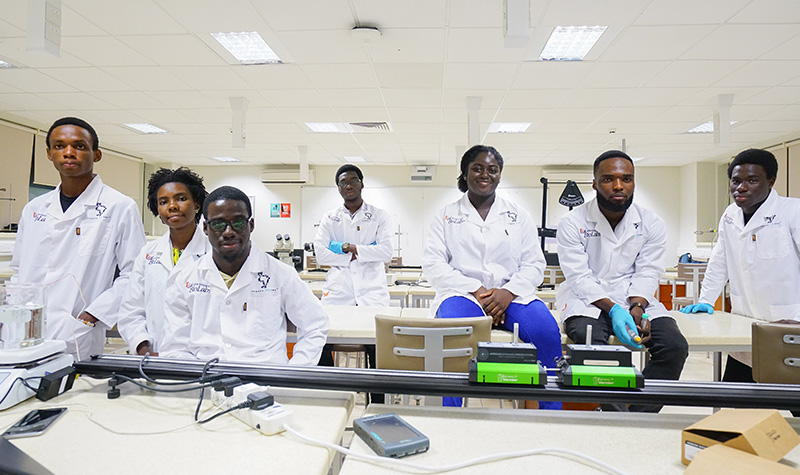 April 8, 2019
April 8, 2019
When Ghana announced intentions to establish a partnership with a US drone delivery service, aimed at health supplies, it generated a lot of skepticism across the country. But on campus, Engineering student Robert Boateng-Duah considered it an exciting opportunity. He had learned about the same drone company delivering health supplies in Rwanda, and he became curious about how he could build delivery drones himself. With Ashesi’s continued expansion and the growing need for item delivery services across campus, he saw an easy test case. His first attempt, however, proved less than successful.
“I had not really appreciated how much went into building a drone,” he says. “I thought I could just stack up some Arduinos, controllers, and circuits together and then boom, I would have a drone. It did not take long for me to recognize that I was being a bit naïve.”
Robert turned to the Engineering community and resources at Ashesi, and together with colleagues and faculty, he started building his drone piece by piece. Using 3D printing and milling equipment on campus, the team successfully built and flew their first drone. Now Robert intends to begin teaching the drone to independently fly to different parts of campus, as the first step to deliveries. His story is similar to that of many other students on campus, taking on projects which they could only have imagined before arriving at Ashesi.
Engineering programme expands possibilities for problem-solving
Since launching in 2015, Ashesi’s Engineering program has brought a new spirit of curiosity and possibility to campus. The tools and resources available in campus labs, accessible to all, has seen students take on old problems in new ways. In one class, for example, students reexamined the problem of poor power supply in Berekuso’s Community-Based Health Planning and Services compound. As the main health center for child delivery in the town, the students designed a solar power system for the compound, helping address a perennial issue.
Other students used existing research to convert plastics into a blend that could be used to close potholes on roads. And together with their faculty, some students undertook research in growing bacteria that could extract gold; with the goal of providing a way to stop the use of poisonous mercury in small-scale gold mining in Ghana. The research would win them two prizes at a biochemistry competition in Boston.

A makerspace community promotes a culture of hands-on learning
Outside of the classroom, a makerspace community has formed that continues to enable students – even those not studying Engineering – to learn how to create and build using Engineering resources on campus. Led by Laboratory Manager, Nicholas Tali, the makerspace culture has made Ashesi’s campus a creative learning hub like no other.
“The goal was to help students really understand and further explore what was taught in class,” he explains. “Now, our makerspace culture serves many more students, and allows them to go as far as their imagination and desire to learn can push them.”
The effort has already seen great results, with ambitious projects like Robert’s delivery drone taking shape; and inspiring others like Joseph to develop 3D printed crafts which helped him launch his art career.
“The makerspace activity has given students insight into advanced fabrication techniques,” shared Ag. Dean of Engineering, Nathan Amanquah. “Over time, they are building more challenging projects and products in a variety of application areas. I see students bringing some of the methods they have learned in the maker’s labs, into their class projects. As a result, they are less afraid of ambitious work.”
Strengthening Ashesi’s problem-solving philosophy
Approximately 8% of Ashesi’s alumni are currently running their own business across various industries, employing and serving thousands. And with a goal to increase this, faculty at Ashesi continue to work to make it easier for students to create a business from the prototypes they build on campus. Entrepreneurship faculty have created resources – like the Ashesi Enterprise Fund – aimed at providing support for students to keep testing their business ideas.
Other partnerships, like that of the Ashesi D:Lab and MIT D-Lab funded by USAID, and the Ford Fund for Youth and Children, provide key support and resources for student entrepreneurs even after they graduate. More than ever, there is an alignment of various efforts on campus to enable students to create new businesses, products, and services. And yet, many on campus consider it just another beginning.
In case you missed it: New Archer-Cornfield Fellowship at Ashesi provides funding for Engineering and Computer Science faculty around the world to come to teach in Ghana.
Share this story
